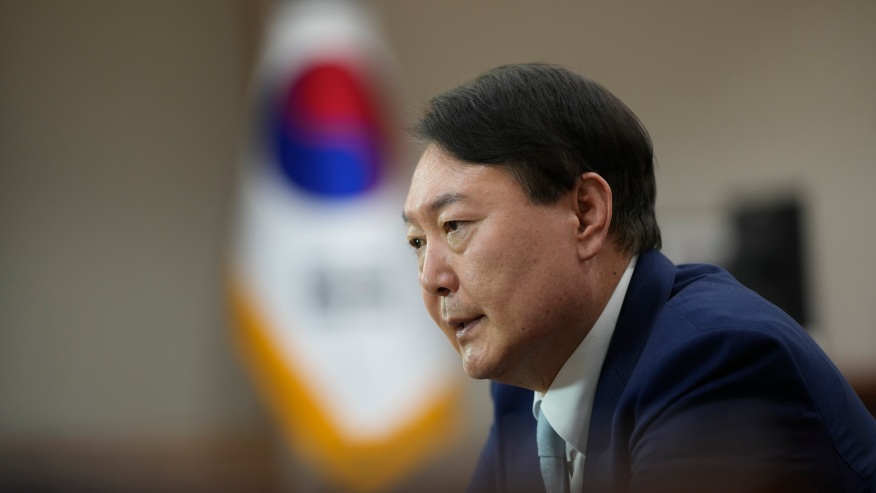A dream of American policymakers since the Korean War has been to draw the Republic of Korea — that is, South Korea — into a trilateral alliance with Japan and the United States. It has been only with tremendous reluctance that security advisers in the White House, military strategists in the Pentagon and diplomats at the State Department in Washington have had to accept the reality that Japan and South Korea, for reasons going deep into their history, simply cannot establish the level of trust, dignity and respect needed to be alliance partners.
Americans, though, refuse to give up the dream. They realize that a formal alliance would be impossible, considering the antipathy between Korea and Japan dating centuries before the Japanese colonial era. For that reason, they hold alive the spirit of “trilateralism,” a difficult word that sounds to military and diplomatic planners as almost the equivalent of an alliance. In the spirit of trilateralism, America hopes to persuade Japan and South Korea to cooperate in building rock-solid defenses against not only North Korea but also China and Russia.
The dream of “trilateralism,” however, risks turning into a familiar nightmare of claims and counter-claims. South Korea’s president, Yoon Suk-yeol, after meeting Japanese Prime Minister Fumio Kishida in the first Korea-Tokyo summit in a decade, believed that he had reached a clear understanding on the hyper-sensitive issues that have plagued goodwill between Japanese and Koreans for decades. His foes immediately charged that his understanding on labor was woefully inadequate, that it did not guarantee back pay (with interest) for the families and descendants of thousands of workers.
Almost as seriously, the Japanese in their latest textbooks stuck to old wordings and interpretations and introduced new ones that left no doubt that they feel the same as always about their 35-year rule over Korea. They do not recognize that the workers forced to labor for huge Japanese companies during World War II, the Pacific War, were slaves; that they did not choose to go to Japan to toil in factories and shipyards. The Japanese refuse to acknowledge the suffering of thousands of young women forced to serve Japanese soldiers before and during the war. And they say Japanese forces never “invaded” China and other countries in the years of the Japanese empire. Rather, they entered them and then withdrew in 1945.
Beyond those tendentious topics, Japan has again laid claim to those two enormous rocks known to Koreans as Dokdo in the middle of the East Sea, which the Japanese call the Sea of Japan. Japanese insist Korean forces seized and occupied the rocks, which they call Takeshima, by force. The ongoing controversy over Dokdo/Takeshima evokes memories of Japanese rule over the entire Korean peninsula.
If the Japanese are not ready finally to concede that Dokdo/Takeshima belongs to South Korea, how can Koreans believe they will not someday decide that they also have the right to rule the entire peninsula as they did in the colonial era? One might say the Japanese surrender in 1945 should have decided that issue forever, but Japanese armies have been marauding and threatening Korea ever since Admiral Yi Sun-sin’s fleet defeated the Japanese off the southern coast more than 400 years ago.
In the face of the legacy of history, the Americans are extremely hopeful that Korean and Japanese forces will be able to work closely together. So, indeed, are President Yoon and Prime Minister Kishida. They appear to have resolved to overlook many of the objections and to press ahead with joint military exercises, working closely on the kind of coordination that would be vital if war were to break out against North Korea.
For three weeks, on the ground, in the air and at sea, American and Korean forces have been playing war games on a scale not seen for years. Most recently, led by the aircraft carrier Nimitz, Americans, Koreans and Japanese have staged exercises on and above the waters off the island of Jeju.
Korea could join the Quad as an observer, or even as a full-fledged member, which would turn the Quad into a Quintet, but Americans also have to recognize that Korea would be reluctant to identify with a grouping that could form an alliance against China. Korea does not want to be seen opposing China’s claims to Taiwan, which America and Japan are committed to defend.
Realistically, the most that Washington can hope for is to maintain strong but separate alliances with both Korea and Japan, while encouraging Korean and Japanese forces to train together, to share information and insights, to be ready to fight against their common foe, North Korea and maybe China, if Chinese troops enter a future conflict, as they did the Korean War in 1950.
For now, policymakers seem happy and relieved by Yoon’s decision to join in war games after years in which his predecessor, Moon, looking for reconciliation with North Korean leader Kim Jong Un, actively discouraged military ties. Similarly, Americans see Koreans and Japanese cooperating closely despite the legacy of history that no one forgets.
The ‘trilateralism dream’ could become a nightmare for Korea, Japan and US




